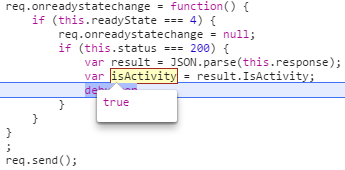This week I had to differentiate between normal entities and activities in Javascript. I had a look into the SDK and remembered my previous post “Get EntitySetName from Metadata“. A little modification and I get true or false from the ‘isActivity’ information in the metadata.
function isActivity(strEntityLogicalName)
{
var req = new XMLHttpRequest();
req.open("GET", Xrm.Page.context.getClientUrl() + "/api/data/v8.0/" +
"EntityDefinitions(LogicalName='" + strEntityLogicalName + "')?$select=IsActivity", false);
req.setRequestHeader("OData-MaxVersion", "4.0");
req.setRequestHeader("OData-Version", "4.0");
req.setRequestHeader("Accept", "application/json");
req.setRequestHeader("Content-Type", "application/json; charset=utf-8");
req.onreadystatechange = function ()
{
if (this.readyState === 4)
{
req.onreadystatechange = null;
if (this.status === 200)
{
var result = JSON.parse(this.response);
var isActivity = result.IsActivity;
}
}
};
req.send();
}
